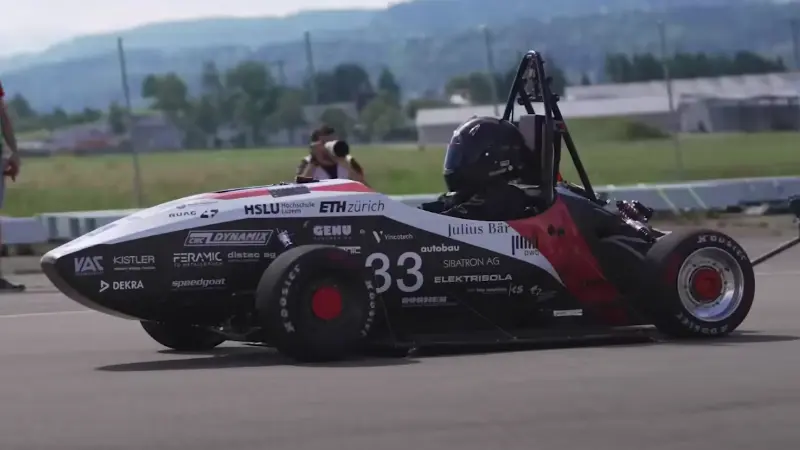EV Goes 0-100 Kmph in <1 Second: Breaks World Record

In a world where most college students spend their free time sleeping, socializing, or scrolling through social media, a group of Swiss students from the Academic Motorsports Club Zurich (AMZ) decided to do something a little more productive.
These sleep-deprived overachievers from ETH Zurich and the Lucerne University of Applied Sciences and Arts broke the world acceleration record for electric vehicles with their self-designed racing car, mythen.
The Guinness World Records confirmed that the team crushed the previous record by accelerating from zero to 100 km/h (62.15 mph) in a jaw-dropping 0.956 seconds over a distance of only 12.3 meters, trouncing the previous record of 1.461 seconds set by a University of Stuttgart team in September 2022.
It was a lot of fun working with other students to continually produce new solutions and put into practice what we learned in class,” said Yann Bernard, head of the motor at AMZ. “And, of course, it is an absolutely unique experience to be involved in a world record.
The team spent nearly a year designing and optimizing every component of mythen, from the printed circuit boards (PCBs) to the chassis and the battery.
Lightweight carbon and aluminum honeycomb materials kept the car's weight at a mere 140 kilos (309 pounds), while four-wheel hub motors and a special powertrain, developed by the students, gave the vehicle an impressive 240 kilowatts (326 hp) of power.
“Effectively transferring that power to the ground is key,” noted Dario Messerli, head of aerodynamics at AMZ. Rather than relying on traditional aerodynamics used by Formula One cars, the team developed a vacuum cleaner-like device to hold the vehicle down to the ground by suction, ensuring strong traction right from the start.
This isn’t the first time AMZ has held the world acceleration record for electric vehicles. They set the record twice before, in 2014 and 2016, only to have it broken by the University of Stuttgart team in subsequent years.
With the record now back in Swiss hands, the ETH Zurich students are confident they won’t be relinquishing it anytime soon.
Driver Kate Maggetti, who piloted mythen to its record-breaking performance, echoed the team’s sentiments, saying, “We worked so hard on this project, and to see it come to fruition with a world record is just amazing. I'm incredibly proud of what we've achieved, and I can't wait to see what the future holds for electric vehicle technology.”
While the achievement is undoubtedly a significant one, the team remains humble and focused on their ultimate goal: continuing to push the boundaries of electric vehicle technology and contribute to a more sustainable future.
And perhaps, just maybe, catching up on some much-needed sleep.
